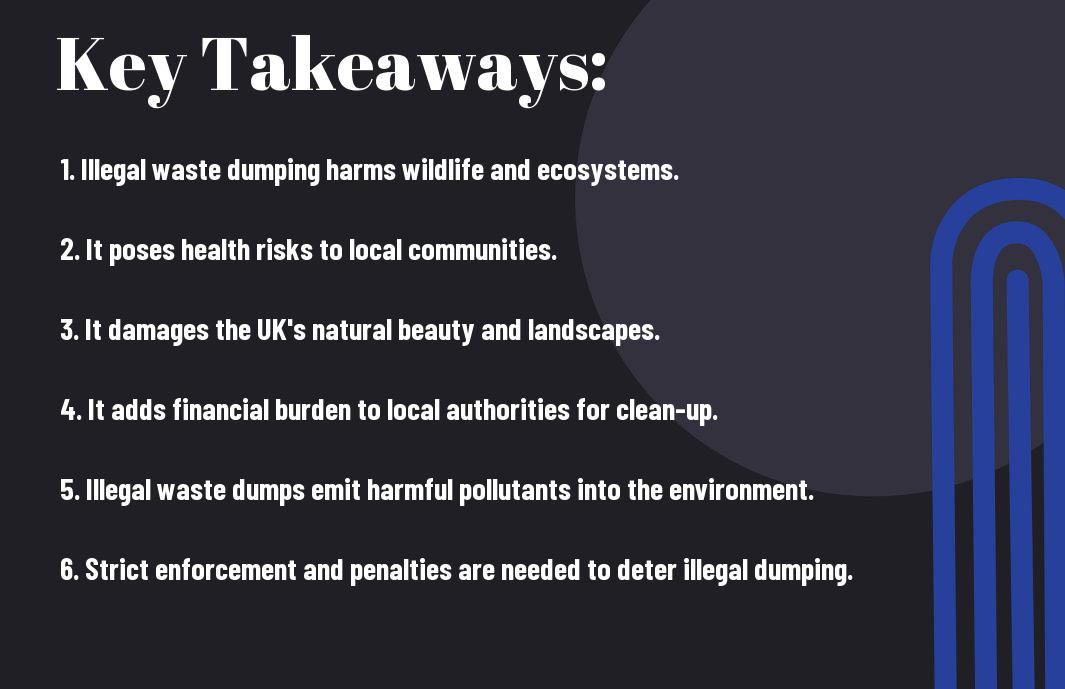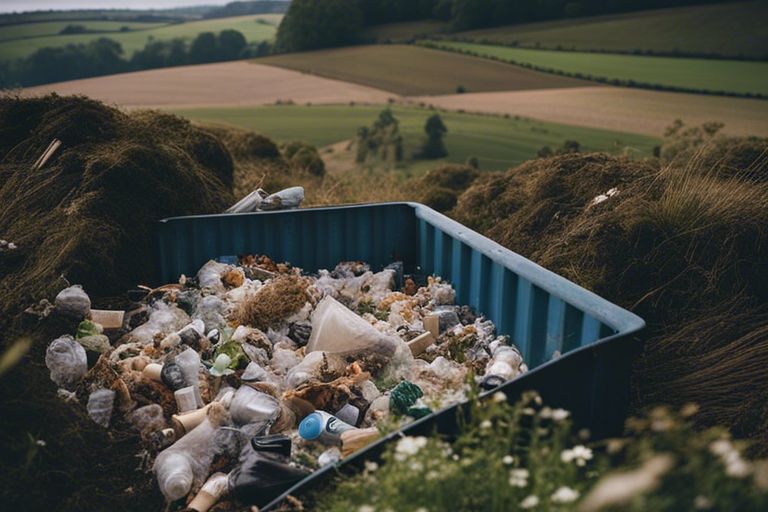Obstreperous activities, such as the illegal dumping of waste, have dire consequences for the environment and public health in the UK. Every year, British plastic waste continues to be illegally dumped and burned abroad, contributing to pollution and ecological damage. The most alarming consequence of this illicit practice is the contamination of our land, air, and water, posing a significant risk to wildlife and human populations. The dangerous chemicals and toxins released from illegal waste dumping can lead to serious health issues, including respiratory problems, cancer, and birth defects. It is imperative for authorities to take strict measures to combat this environmental threat and enforce positive waste management policies to safeguard our natural surroundings and well-being.
Key Takeaways:
- Environmental Damage: Illegally dumping waste in the UK can lead to severe environmental damage, including pollution of waterways, disruption of local ecosystems, and the release of harmful toxins into the environment.
- Health Risks: The illegal dumping of waste can pose significant health risks to both humans and wildlife, as exposure to hazardous materials can lead to respiratory problems, skin irritations, and other serious health issues.
- Legal Consequences: Those found guilty of illegally dumping waste in the UK can face severe legal repercussions, including hefty fines, imprisonment, and damage to their reputation and business. It is crucial to adhere to legal waste disposal regulations to avoid these consequences.


The Environmental Impact
Pollution and Ecosystem Damage
Illegal waste dumping in the UK has serious consequences for the environment, particularly in terms of pollution and damage to ecosystems. Toxic chemicals and hazardous materials seep into the soil and water, contaminating natural habitats and leading to a decline in the health of ecosystems. This pollution not only affects the local environment but can also have wider-reaching implications, impacting neighbouring ecosystems and potentially causing long-term damage.
The release of pollutants from illegal waste dumping poses a significant threat to the delicate balance of the natural world. Contaminated water sources and soil can lead to the decline of plant and animal species, disrupting the biodiversity of the affected areas. The impact on ecosystems can be severe, with long-lasting effects that may take years to remediate.
Threats to Wildlife and Biodiversity
The illegal dumping of waste in the UK poses a direct threat to wildlife and biodiversity. Animals and plant species are vulnerable to the harmful effects of pollution, with many facing the risk of illness, displacement, and even extinction. The disruption of natural habitats and food sources can have severe consequences for the survival of certain species, leading to a decline in biodiversity and overall ecological stability.
Furthermore, the introduction of non-native species through illegally dumped waste can have detrimental effects on native wildlife, further exacerbating the threats to biodiversity. Invasive species can outcompete and displace native flora and fauna, leading to imbalances and disruptions in the ecological system.
In addition to the direct impact on wildlife, the loss of biodiversity due to illegal waste dumping can have wider implications for the functioning of ecosystems and the services they provide, such as pollination and nutrient cycling. It is crucial to address and mitigate the threats posed to wildlife and biodiversity by illegal waste dumping in order to protect the natural environment.

Socio-Economic Effects
Illegal waste dumping in the UK has significant socio-economic effects that impact local communities and the wider society. From the costs to local governments and taxpayers to the impact on community health and safety, the consequences are far-reaching and detrimental.
Costs to Local Governments and Taxpayers
The illegal disposal of waste places a heavy financial burden on local governments and taxpayers. The clean-up and remediation costs associated with illegal waste sites can be substantial, diverting funds that could otherwise be allocated to essential public services. Additionally, the costs of monitoring and enforcement to prevent future dumping further strain public resources, ultimately placing the financial responsibility on taxpayers.
Impact on Community Health and Safety
Illegal waste dumping poses a significant threat to community health and safety. Hazardous waste materials can contaminate air, water, and soil, leading to adverse health effects for residents living near the disposal sites. Furthermore, these sites can attract criminal activities and pose physical dangers, endangering the well-being of local communities.
In addition, the presence of illegal waste sites can contribute to a decline in property values, further impacting the socio-economic stability of the affected areas.
Legal Frameworks and Enforcement
When it comes to illegal waste dumping in the UK, there are strict legal frameworks in place to prevent and punish such activities. These laws are designed to protect the environment, human health, and the wellbeing of communities. The enforcement of these laws is crucial in deterring individuals and businesses from engaging in illegal waste dumping.
UK Legislation Against Illegal Dumping
The UK has established a comprehensive set of laws and regulations to address illegal waste dumping. The Environmental Protection Act 1990, for example, prohibits the deposit of controlled waste on land without a permit. The Waste (England and Wales) Regulations 2011 further outline the requirements for the safe and lawful disposal of waste. These laws are enforced by government agencies such as the Environment Agency, which has the authority to investigate and prosecute offenders.
Enforcement Challenges and Limitations
Despite the existence of stringent legislation, enforcement against illegal waste dumping poses various challenges and limitations. One of the key challenges is the covert nature of illegal dumping, making it difficult for enforcement agencies to detect and apprehend offenders. Additionally, the lack of resources and funding for enforcement activities hinders the effectiveness of combating illegal waste dumping. It is essential to address these challenges in order to effectively protect the environment and public health from the dangers of illegal waste dumping.
Enforcement agencies in the UK face an uphill battle in tackling illegal waste dumping, as offenders constantly seek loopholes and ways to evade detection. Proper funding, resources, and strategic approaches are necessary to overcome these challenges and uphold the legislation aimed at curbing illegal waste dumping.
Solutions and Prevention Strategies
Illegal waste dumping in the UK poses a significant challenge, but there are solutions and prevention strategies that can help address this issue. Through innovative waste management approaches and community involvement and education initiatives, we can work towards reducing the harmful consequences of illegal waste dumping.
Innovative Waste Management Approaches
One of the key ways to combat illegal waste dumping is through innovative waste management approaches. This includes the development and implementation of advanced waste treatment technologies and the establishment of more efficient recycling and waste processing facilities. By investing in these modern approaches, we can significantly reduce the amount of waste that ends up illegally dumped, protecting our environment and public health.
Community Involvement and Education Initiatives
Engaging local communities and educating the public about the impact of illegal waste dumping is essential in addressing this issue. Community involvement and education initiatives can help raise awareness about the consequences of improper waste disposal and encourage individuals to take responsibility for their waste. By fostering a sense of community responsibility, we can empower people to actively participate in waste management efforts and deter illegal dumping.
Community involvement and education initiatives also play a crucial role in promoting sustainable behaviours and fostering a sense of environmental stewardship. By instilling a commitment to responsible waste management in communities, we can create a lasting impact and reduce the occurrence of illegal waste dumping.
The Consequences of Illegal Waste Dumping in the UK
In conclusion, the illegal dumping of waste in the UK has severe consequences for both the environment and public health. From contamination of water sources to air pollution, the impact of illegal waste dumping is far-reaching and damaging. The government and relevant authorities must continue to enforce strict regulations and penalties to deter individuals and businesses from engaging in this harmful practice. Additionally, public awareness and education about the proper disposal of waste are crucial in preventing further damage to our environment. It is imperative that we all take responsibility for our waste and work towards sustainable and environmentally-friendly practices to protect our communities and ecosystems for future generations.
FAQ
Q: What are the consequences of illegal waste dumping in the UK?
A: Illegal waste dumping in the UK can lead to severe environmental pollution, damage to ecosystems, and harm to human health.
Q: How does illegal waste dumping affect the environment in the UK?
A: Illegal waste dumping can contaminate soil, water, and air, leading to the destruction of habitats and the loss of biodiversity.
Q: What are the legal penalties for illegal waste dumping in the UK?
A: Perpetrators of illegal waste dumping in the UK can face hefty fines, imprisonment, and confiscation of assets.
Q: How can individuals report incidents of illegal waste dumping in the UK?
A: Incidents of illegal waste dumping in the UK can be reported to the Environment Agency or local council authorities.
Q: What measures are being taken to prevent illegal waste dumping in the UK?
A: The UK government is implementing stricter regulations, conducting surveillance, and raising public awareness to prevent and combat illegal waste dumping.







